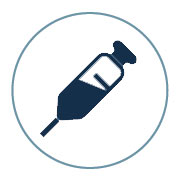The Beginning: Trying to get Pregnant
 You’re ready — you’ve made the leap and decided it’s time to have a baby. You and your partner stopped using contraceptives, and for the first time you’re actually looking forward to a missed period. Unfortunately, things don’t seem to be going as planned; one month, two months, three months – you’re still not pregnant. “It’s okay,” you think, reminding yourself that it took your one friend five months to become pregnant, “It will happen sooner or later.”
You’re ready — you’ve made the leap and decided it’s time to have a baby. You and your partner stopped using contraceptives, and for the first time you’re actually looking forward to a missed period. Unfortunately, things don’t seem to be going as planned; one month, two months, three months – you’re still not pregnant. “It’s okay,” you think, reminding yourself that it took your one friend five months to become pregnant, “It will happen sooner or later.”
As the months go by, you may begin to wonder if something is wrong. The good news is that there is a rule of thumb to help you determine the appropriate time to ask your doctor about infertility. Women under the age of 35 should try for 12 months before talking to their doctor about infertility, while those over the age of 35 should wait only 6 months. If your general practitioner is unable to identify an obvious cause for your infertility, he will direct you to your OB/GYN or refer you if you do not already have one.
Signs of Infertility
Infertility is defined as the inability to become pregnant for one year. It is a condition that affects 1 in 8 couples, with one third of infertility cases attributed to female factors, one-third to male factors, and one-third to a combination of both female and male factors.
Female Symptoms:
- Abnormal or irregular periods
- Overly painful periods (intense back pain and pelvic pain)
- Sudden skin changes such as acne
- Hair on the lips, chest and chin
- Hair loss or hair thinning
- Weight gain
- Sudden change in sex drive
Male Symptoms:
- Change in hair growth
- Change in sex drive
- Pain, lump or swelling of the testicles
- Erectile and ejaculatory issues
- Small, firm testicles
How Is a Fertility Specialist Different From an OB/GYN?
Let’s break down the word OB/GYN. Many people are familiar with this term but surprisingly few know what it actually stands for. It is short for obstetrics and gynecology. Obstetrics is the field of health care that focuses on childbirth and taking care of women who are pregnant or giving birth. Gynecology is the broader focus on women’s reproductive health.
An OB/GYN will be able to take care of a pregnant woman and treat conditions that affect the health of her reproductive system, such as infections or diseases, but may not be able to treat specific causes of infertility. Fertility specialists go through additional training that focuses specifically on treating infertility issues. Therefore, a fertility specialist is who you will see in order to begin a specific treatment plan to help you get pregnant.
What to Expect From Your OB/GYN Visit
Your OB/GYN will be able to determine the specific cause of your infertility if your general practitioner is unable to. There are many possible underlying causes of infertility, categorized as either mechanical or hormonal. In some cases, the condition is caused by a combination of factors from both categories.
Mechanical:
|
|
Hormonal:
|
|
It may take more than one visit for the doctor to identify the exact cause of infertility, especially if a woman may have multiple conditions that affect her ability to conceive. Once you are given a definitive reason for your infertility, consider the steps mentioned in the next section to help manage the frustration, anger, anxiety, or other negative feelings you may be experiencing following the diagnosis.
Coping With Infertility
Infertility can be a long and taxing journey. Some days you may want to throw your pregnancy test at the next person who asks you “So, when are you having kids?”; Other times, you may not want to get out of bed. Remember that you are allowed to have these feelings and should acknowledge them. The following are several ways to help you cope with an infertility diagnosis.
Take a Break
Now is a perfect time to go on that vacation (or staycation!) that you’ve been wanting to take. Even simply taking some time alone with your partner can help you clear your mind, process your feelings, and determine what the next steps in your journey will be.
Do this for a week — maybe even a little bit longer — depending on how long you feel you need. Do not feel in a rush to jump into starting treatments or visiting countless specialists. Think of this time as the relaxing stretch and warm-up session before a marathon. Once you feel relaxed and focused, it is time to tackle your diagnosis head-on.
Educate Yourself About Infertility
We encourage you to research your condition and what the available treatment options are before committing to one. You should have access to the treatment success rates for each provider you are considering in order to assess the likelihood that a given treatment will work for you.
In addition, it is important to select a provider that can deliver the personalized care and support you need. To this end, we suggest asking the provider to put you in touch with one or more past patients who can tell you about their experience. When speaking with these women or couples, ask whether they felt engaged throughout the treatment process and like a member of the team whose input was valued and encouraged. This is a core principle of our treatment philosophy at Clear Passage and we find that it is critical for the patient’s success.
Build a Support Network
An infertility diagnosis can create a feeling of isolation — with no one to lean on. It can also make you feel like you’re the only one struggling with these issues. While it may seem like every couple you see has a child, it is critical to remember that you are not alone — 1 in 8 couples face fertility issues. Putting this into perspective, you likely know someone who is going or has already gone through this.
The support of others can make a huge difference in how you perceive your situation and prevent you from being consumed by feelings of loneliness and hopelessness. The good news is that there are many ways you can connect with others who are in a similar situation:
- Online infertility communities – This is a place to anonymously share your story and get feedback from other infertility sufferers, some of whom have gone through the same treatments that you are undergoing or considering.
- Infertility blogs- Reading blogs is another way to ‘meet’ individuals struggling with infertility and learn about their journeys. Reading about someone’s first-hand experiences can be a tremendous source of comfort.
- Local support groups- Many areas have local support groups that meet regularly. The get-togethers aren’t always focused on discussing infertility — sometimes it can be nice to simply get out of the house and have fun with people who you share a common bond with. Check out the list of professionally and peer-led support groups compiled by RESOLVE, The National Infertility Association.
- Family- Even if you are not comfortable announcing your diagnosis to your entire family, you may want to let a select few family members in on what’s going on. Let them know that what you are going through will be tough and you will need people to lean on and listen.
Female Infertility Treatment Types
Medication
 Medication can help women who have trouble ovulating. Drugs like clomiphene (more commonly known as Clomid) increase a woman’s level of hormones responsible for eggs maturing in the ovaries. Medication can also increase the number of eggs released by a woman in order to improve the chances of conception. Fertility specialists will generally recommend another approach if the woman fails to become pregnant after six menstrual cycles.
Medication can help women who have trouble ovulating. Drugs like clomiphene (more commonly known as Clomid) increase a woman’s level of hormones responsible for eggs maturing in the ovaries. Medication can also increase the number of eggs released by a woman in order to improve the chances of conception. Fertility specialists will generally recommend another approach if the woman fails to become pregnant after six menstrual cycles.
In Vitro Fertilization (IVF)
 IVF is a fertility treatment that unites sperm from a man and eggs from a woman. They are incubated in a laboratory with the hope that an embryo forms. The embryo is then placed inside the uterus to develop. IVF is an involved, multi-stage process. If you are considering IVF, we encourage you to familiarize yourself with the success rates and costs involved. Learn more about IVF.
IVF is a fertility treatment that unites sperm from a man and eggs from a woman. They are incubated in a laboratory with the hope that an embryo forms. The embryo is then placed inside the uterus to develop. IVF is an involved, multi-stage process. If you are considering IVF, we encourage you to familiarize yourself with the success rates and costs involved. Learn more about IVF.
Intrauterine Insemination (IUI)
 This process involves placing a man’s sperm in a woman’s uterus using a long tube. This treatment is generally used in cases of male factor infertility (low sperm count, low mobility, or erectile dysfunction), but it can also be used in women with cervical factor infertility.
This process involves placing a man’s sperm in a woman’s uterus using a long tube. This treatment is generally used in cases of male factor infertility (low sperm count, low mobility, or erectile dysfunction), but it can also be used in women with cervical factor infertility.
Tubal Surgery
 Blocked fallopian tubes are a common reason for surgery to a woman’s reproductive organs, with the goal of opening the tubes so that sperm and egg can meet. Unfortunately, surgery to open fallopian tubes provides only a brief window of time to conceive; the body forms bands of internal scar tissue called adhesions as it heals from the surgery, thereby re-blocking the tubes. Tubal surgery is also associated with an increased risk for ectopic/tubal pregnancy. An ectopic pregnancy occurs outside the uterus.
Blocked fallopian tubes are a common reason for surgery to a woman’s reproductive organs, with the goal of opening the tubes so that sperm and egg can meet. Unfortunately, surgery to open fallopian tubes provides only a brief window of time to conceive; the body forms bands of internal scar tissue called adhesions as it heals from the surgery, thereby re-blocking the tubes. Tubal surgery is also associated with an increased risk for ectopic/tubal pregnancy. An ectopic pregnancy occurs outside the uterus.
Physical Therapy
 Some women prefer a natural fertility treatment rather than medication regimens or invasive surgical procedures. Our five-day all-natural treatment has helped many women become mothers. The results of our treatment, which addresses both hormonal and mechanical causes, were recently published in a 10-year retrospective study in the journal Alternative Therapies in Health and Medicine. Learn more about our infertility treatment and success rates.
Some women prefer a natural fertility treatment rather than medication regimens or invasive surgical procedures. Our five-day all-natural treatment has helped many women become mothers. The results of our treatment, which addresses both hormonal and mechanical causes, were recently published in a 10-year retrospective study in the journal Alternative Therapies in Health and Medicine. Learn more about our infertility treatment and success rates.
Three Key Things to Consider Before Treatment
Before your begin treatment, we strongly suggest discussing the following with your partner to make sure you are on the same page and both have the same expectations throughout the process. You may find it helpful to create a list of pros and cons for each of the decisions you are faced with.
1) The first thing to decide is how long you will continue to pursue fertility treatment. It helps to have an idea for when you may begin considering other options such as adoption or continuing a child-free life. This decision may be a difficult one and you may want to come back to it once you have begun treatment(s), based on the results you are seeing.
2) The financial burden of infertility is one of the biggest reasons couples can no longer continue treatment. Setting an initial budget (which can change as time goes on) for these expenses can help you manage some of the stress associated with infertility treatment. Instead of worrying week to week about how much you can spend or will spend, create an overview of your finances so you know how much you can realistically set aside for treatments. It is also important to work with a provider who is transparent about what you can expect to pay for your treatment, from start to finish.
3) The last thing you want to consider is which treatments best fit your goals. For instance, if your goal is to get pregnant as quickly as possible, you should compare different providers’ success rates and examine, on average, how many rounds of treatment their patients require before conceiving. If you are concerned about potential side effects and complications of fertility medications or surgery, connect with women and couples who have tried these approaches and take their feedback into account when making your decision.
Congratulations
If you’ve made it to the end of this page, you are now ready to take control of your infertility. You are now aware of what curveballs this condition can throw at you. It will be difficult at times but we hope that the suggestions in this article will help you feel more equipped to deal with your journey to motherhood. If you have other tips for dealing with the stresses of infertility, we invite you to share them in the comments below.
Do you or someone you know struggle with infertility? Contact us at 1 (352) 336-1433 or fill out our online contact form to schedule a phone consultation with a therapist, at no cost to you, and learn whether our therapy is right for you.
Related Content:
Diet
Ectopic Pregnancy
Sexual Dysfunction
General Info
- Book Chapters: Overcome Infertility and Pain, Naturally
- How to Treat Infertility Naturally
- Everything about the Best Natural Infertility Treatments
- Fertility Treatment – The Natural Way
- Infertility Risk Factors
- What Causes Infertility in Women? (Infographic)
- [Infographic] Common Risk Factors for Infertility
- How Does Tubal Surgery Compare to Other Infertility Treatments?
- Published Pregnancy Rates With and Without Clear Passage®
- Budgets and Numbers and Bills, Oh My! – Paying for Infertility Treatment
- English Surrogacy
- Guide Through Infertility: From Diagnosis to Treatment
- Spirituality Can Help Women with Premature Ovarian Failure
- For Healthcare Providers: Women’s Health Issues and Female Infertility
Infertility: Adhesions | Blocked Fallopian Tubes | Diet | Ectopic Pregnancy | Endometriosis | FSH | Hydrosalpinx | Hysterosalpingography | Female Infertility | IVF Conditions | Ovarian Failure | PCOS | Secondary Infertility | Unexplained Fertility





















